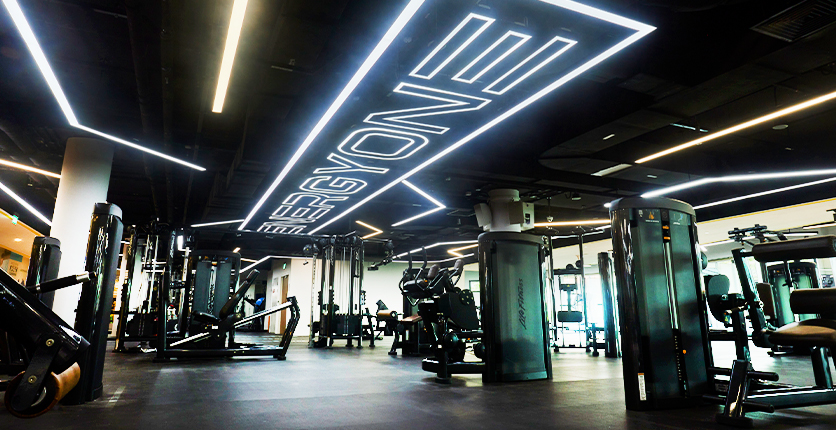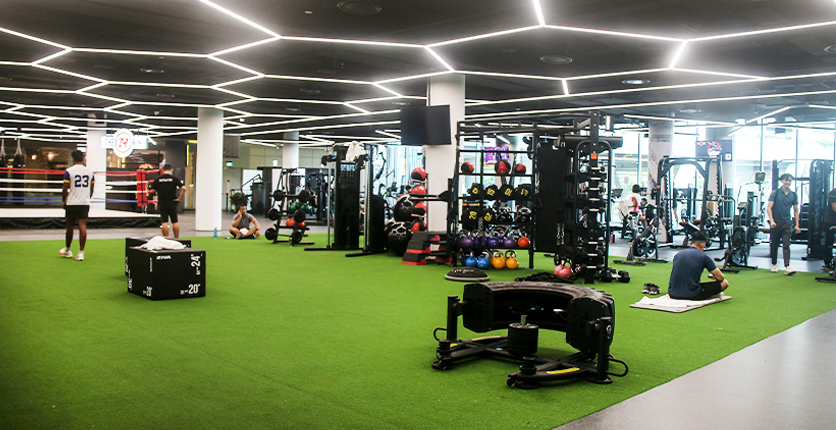If getting into shape and improving your fitness are on your list of to-dos this year, you’ll appreciate some advice on how to get started. It can be daunting embarking on a fitness routine, especially if you’re unfit or have never stepped foot in a gym before.
But, like everything else, it pays to set some goals and to start slow. Along the way, remember to track your progress, ask for guidance if you need it, and listen to your body to minimise your risk of injury.
According to Dr Frankie Tan, a sports physiologist and Chairman of SAFRA’s gym management committee, your workouts will also be more fun – and you’ll feel more motivated to keep doing them – if you do exercises that you enjoy or if you work out with a buddy.
And don’t forget that keeping fit also includes eating the right foods.
“A healthy and balanced diet is important to maximise your fitness gains and performance,” says Dr Frankie.
“You need sufficient calories to fuel and support your workouts in addition to your other regular daily activities. Your weight, and more importantly, your body composition (body fat versus lean body mass), plus your overall wellbeing can be a good indicator of how well you’re doing with your diet.”
Here are more tips from Dr Frankie to get fit and keep fit in 2023.

Q: What are the first steps to getting our fitness journey going?
Dr Frankie: Determine your reasons for wanting to get serious about your fitness, and then think about potential obstacles to this goal and how you’d overcome them – for example, are you short on time? Do you lack discipline? Are you deterred by the costs involved with getting fit? The problem may be a combination of different things.
It’s important to start your journey from where you are right now, remembering that consistency is key to getting the best results.

Q: How can someone who’s unfit, feel more confident about starting a fitness routine?
Dr Frankie: Sign up for trial sessions or group classes to begin with, have a friend who is relatively fit to guide you, or engage a personal trainer. If you choose to get fit on your own, start with exercises that you enjoy – enjoyment helps build confidence and compliance.
While consistency is important, don’t be too hard on yourself if you miss a workout session.
To keep your motivation up, include exercise in your daily routine, work out with friends or family members, or pay upfront for workouts, as this may make you less likely to skip them.
Tired of your usual gym routine? Shake things up with a Battle Rope Workout!

Q: Do you have any tips to avoid injuries at the gym?
Dr Frankie: Follow the instructions on the machines, don’t attempt any exercise that you’re unsure about and ask other gym users or trainers for help if need be.
Remember to also proceed progressively – don’t try to do too much, too soon. And finally, if you have musculoskeletal and/or medical conditions, get expert advice before starting an exercise routine.
Find out more about how to prevent sports injuries.

Q: Whom might benefit from hiring a personal fitness trainer?
Dr Frankie: A good trainer can educate you and make your exercise programme safer, more effective and more enjoyable. You may benefit from hiring one if you’re the type who needs more handholding. Your trainer can also help you set goals, hold you accountable to those goals, and motivate and challenge you to achieve them, whether the goals are related to weight loss, health gain, athletic and performance gains, or looking and feeling better.
A trainer can also help you if you’re keen to take your training to the next level but don’t know how to go about it.

Q: How important is it to warm up and cool down, prior to and after exercising?
Dr Frankie: Warm-up and cool-down exercises have a range of benefits. They may improve performance by increasing blood flow and oxygen delivery, priming your muscles and the soft/connective tissues around your joints, and preparing you psychologically for your workouts.
Additionally, they help reduce muscle soreness and minimise your risk of injury, and enhance recovery and wellbeing post-exercise.

Q: Why is it important to do both cardiovascular and strength-training exercises?
Dr Frankie: Cardiovascular exercise improves your stamina as it strengthens your heart, lungs and blood vessels. Strength training or resistance training helps with muscular fitness – that is, it improves our muscular strength, balance and coordination.
An exercise programme that includes both cardiovascular and resistance training offers invaluable benefits that neither type of exercise would otherwise offer alone. Together, these exercises enhance your cardiovascular and metabolic health and fitness, thereby protecting you against many cardiovascular and metabolic diseases.
SAFRA members, start your fitness journey in 2023 by signing up for an EnergyOne gym membership at just $57.50 per month! Work out at your convenience with unlimited access to 6 EnergyOne gyms at SAFRA clubhouses island-wide. Your spouse can also join you at just $33.33 per month. For more info, go to safra.sg/E1main
Existing members can also renew your membership at just $40 per month. Find out more here.
Non-SAFRA Members are welcome to join as well from $70 a month, plus receive complimentary access to SAFRA swimming pools, steam rooms, and more! Find out here.
All Promotions end 31 Mar 2023.
Want more articles like this, and other lifestyle content right in your inbox? Download the new SAFRA mobile app and opt in for the eNSman Newsletter – you don’t need to be a SAFRA member to subscribe – and never miss another story!







